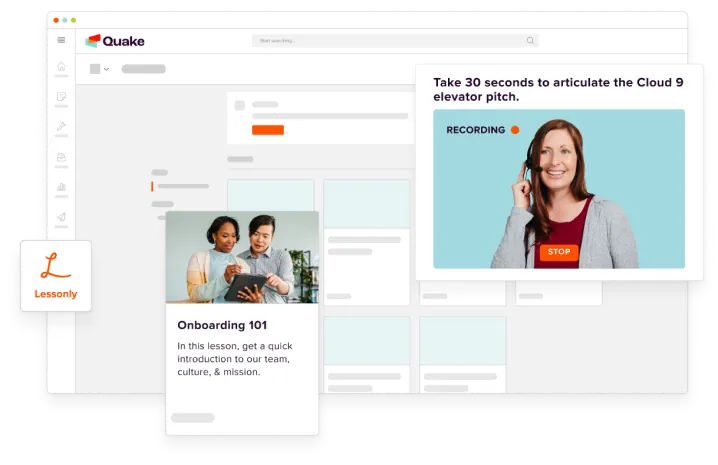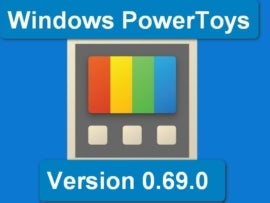-
Gusto: Best for small businesses
-
Freshteam: Best for a centralized HR system
-
GoCo: Best for organizations with over 100 employees
-
BambooHR: Best for combined recruiting and onboarding efforts
-
Eddy: Best for remote worker onboarding
-
Lessonly by Seismic: Best for new hire training
Hiring new talent is an ongoing necessity for growing companies. However, bringing a new hire on board can be a challenging and sometimes-overwhelming process as you manage different types of paperwork, grant access to various company systems, manage employee benefits, set up credentials, and ensure the new hire feels welcome, prepared and comfortable with information overload.
SEE: Best payroll software of 2023: Compare features & benefits (TechRepublic)
Onboarding software can make this process easier for human resources, management and the new hire by streamlining and automating onboarding processes. This guide will provide information about the best onboarding software, the top features and benefits of working with this kind of technology, and how to choose the right onboarding solution for your own business.
Jump to:
- Best onboarding software for new employees
- Key features of onboarding software
- Benefits of using onboarding software
- How to choose the best onboarding software for your business
Best onboarding software for new employees
Gusto: Best for small businesses
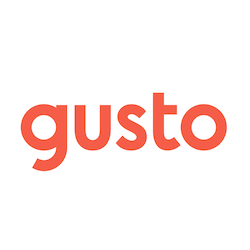
Gusto is a complete HR software solution that offers payroll, onboarding and insurance features. Specifically for onboarding needs, Gusto simplifies the process with custom onboarding checklists and software provisioning support. Its simplicity and ease of use make it ideal for small businesses.
There are three pricing models for Gusto: Simple, Plus and Premium. Pricing starts at a fixed price of $40 per month with $6 per month per person added on.
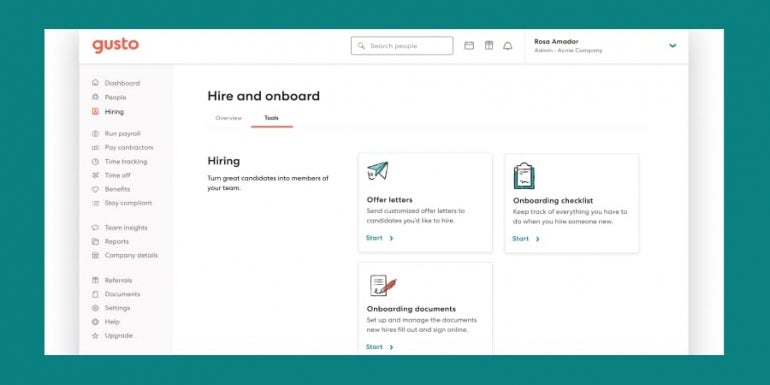
Top features
- Comprehensive onboarding checklists with administrative visibility into pending tasks and missing documents.
- An extensive FAQs section for new hires.
- Employee self-service for health insurance, retirement and other benefits management.
Pros
- Gusto provides a fast, smooth and simple interface for HR admins and employees.
- Gusto uses a transparent pricing structure.
- This software creates a seamless connection between HR and payroll modules.
Cons
- Users can’t pick and choose specific HR modules.
- Gusto lacks a mobile app; although, the website is optimized for mobile use.
- There is a lack of post-hire training features.
Freshteam: Best for a centralized HR system
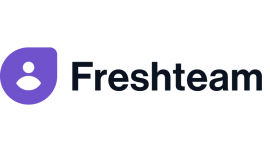
Freshteam by Freshworks is one of the best-centralized HR platforms that can handle a variety of HR functions, including job posting, onboarding and securing all employee information in a centralized database. It also has an excellent mobile app, ideal for on-the-go HR professionals. The mobile app can be used to schedule interviews, view candidate profiles and foster collaboration for HR teams.
Freshteam pricing depends on which of its four plans — Free, Growth, Pro or Enterprise — you choose. The free plan has a maximum limit of 50 employees. The paid plans start at $1 per employee per month with a $59 platform fee per month if you choose to subscribe to its annual plan. Monthly plans start at $1.20 per employee per month with a $71 platform fee per month.
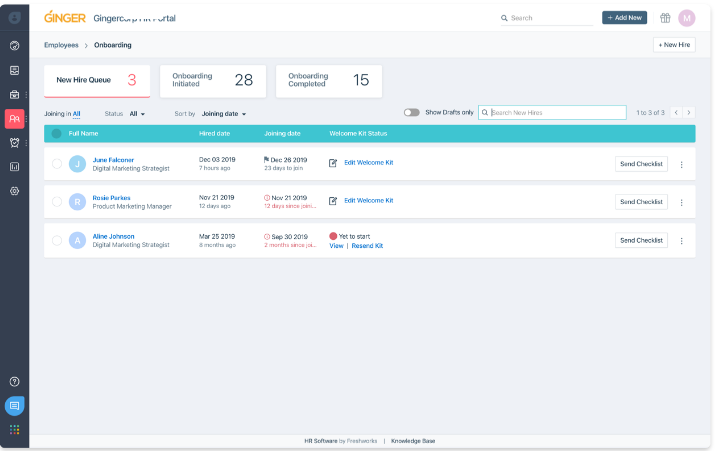
Top features
- 360-degree visibility from hiring to onboarding.
- A feature-rich mobile app that is fast and easy to use.
- Checklist for onboarding and offboarding.
- HR reports and analytics.
Pros
- The free plan includes all core HR features, which is rare for most onboarding software.
- The software offers excellent HR reporting and analytics functionalities.
Cons
- It can be expensive for organizations with many employees.
- Third-party integrations are limited.
GoCo: Best for organizations with over 100 employees
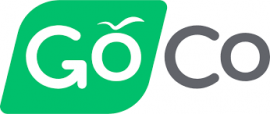
GoCo is highly customizable onboarding software that starts with a blank slate. Users have several options to create workflows and automate their processes, creating a hands-free onboarding experience that is tailored to the requirements of their business. From hiring to managing benefits, this is an all-in-one onboarding solution.
The pricing model of GoCo is $5 per employee per month.

Top features
- Magic Documents, a document creator offered by GoCo, allows users to create, sign, share and track documents.
- The Workflow Builder by GoCo offers advanced functionality with a simple and easy-to-use interface.
- Existing payroll and benefits data gets automatically synced with GoCo.
Pros
- GoCo modules easily integrate with existing HR processes for a smooth transition.
- Customizable workflows allow users to have complete control over onboarding processes.
- Reviews of GoCo’s customer service are exceptional. Not only does GoCo provide reliable support for troubleshooting, it also often turns customer feature requests into new features.
Cons
- There is no social feed where users can make important announcements or share milestones.
- While there are employee training tools in GoCo, they lack functionality. For example, GoCo has only a few course creation and progress monitoring tools.
- The mobile app needs improvement.
BambooHR: Best for combined recruiting and onboarding efforts
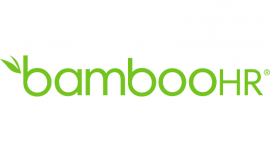
If you are looking for HR software that handles all recruiting and onboarding functions, then BambooHR is one of the best options on the market. From job posting to onboarding, it can manage all HR functions.
Beyond the most basic of onboarding features, BambooHR differentiates itself with self-service onboarding for new employees, electronic signature functionality and offboarding support resources for HR administrators. The pricing model for BambooHR is customized based on business needs, so you’ll need to contact BambooHR to get a quote based on your requirements.

Top features
- Employee self-service portal.
- Integrations with a variety of third-party software and add-ons.
- Application tracking system with complete visibility into recruitment processes.
Pros
- BambooHR has an extremely user-friendly interface.
- The scalability of BambooHR makes it work for organizations of all sizes.
- This is a single platform that can handle all processes throughout the employee lifecycle.
Cons
- A lack of training tools means you will need to integrate with third-party applications if you want new hires to complete any training courses.
- BambooHR does not share pricing information transparently. According to user reviews, they are more expensive than the competition.
- BambooHR offers limited built-in reporting features.
Eddy: Best for remote worker onboarding
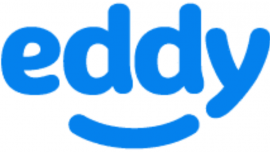
Eddy is a top choice for a streamlined onboarding process that eliminates the need for tedious HR paperwork. Not only can it be used for all onboarding processes, but it also has inbuilt functionality for payroll, paid time off, hiring and more. In addition, with features such as the Eddy welcome package, remote workers will have a more immersive experience during onboarding.
The Eddy HR suite includes four modules: Eddy Hire, Eddy People, Eddy Train and Eddy Payroll. Onboarding features are mostly included in the Eddy People module. Different pricing models are offered at Eddy, with the most basic version starting at $8 per month per employee.
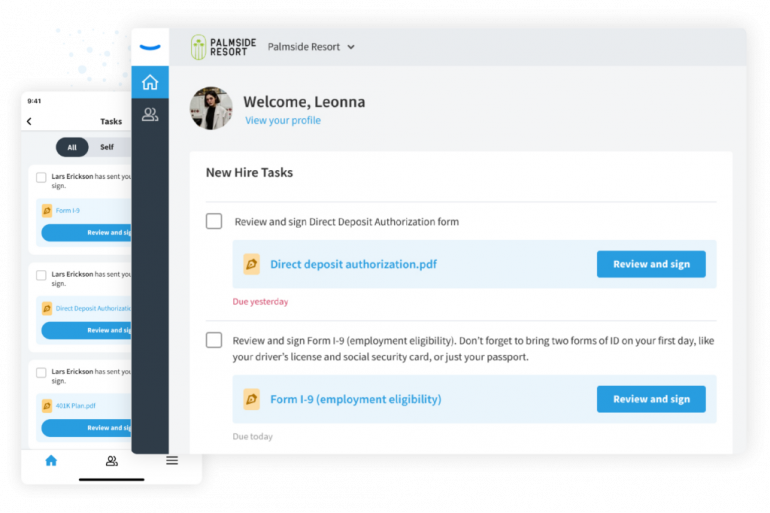
Top features
- Customized onboarding packets that include first-day messages, digitally signable paperwork and a list of trackable tasks for new hires.
- Easy paid time off and mobile time tracking for remote and on-site employees.
- Centralized storage for employee directories and important company documents.
Pros
- Eddy is deeply customizable.
- The company has received many positive customer service reviews.
- Eddy has a clean and organized user interface.
Cons
- There is no free version or free trial available.
- Switching between different HR modules can be confusing.
Lessonly by Seismic: Best for new hire training

Lessonly, acquired by Seismic in 2021, is learning management software that offers a complete onboarding tool set for administrators. It is best for organizations that require extensive training for new hires, such as customer service companies and organizations that require specific compliance or safety training.
Lessonly by Seismic comes with a customized pricing model. Prospective customers will need to contact the Seismic team directly for more information.
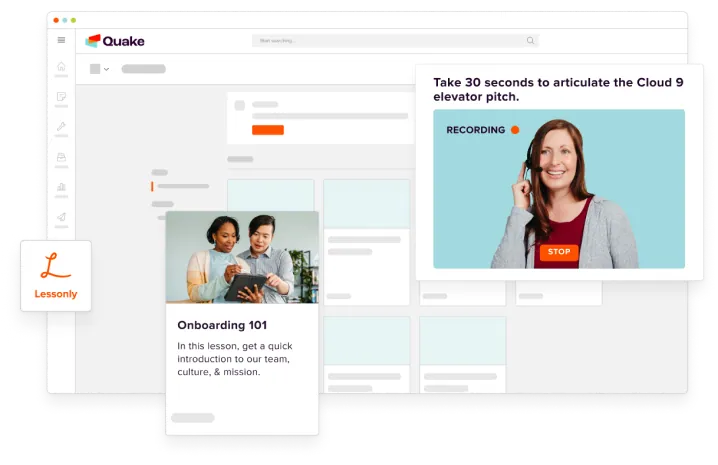
Top features
- Coaching Plan feature to design courses, improve employee skill development and track progress.
- Seamless integration with third-party tech stacks such as customer relationship management, content authoring, project management and HR applications.
- Learning paths for employees at any stage.
Pros
- It is quick and easy to design courses.
- Lessonly offers concurrent training modules, which makes it perfect for mergers and acquisitions.
- It is scalable, making it ideal for large enterprises.
Cons
- All core HR features are available; however, advanced features such as payroll and e-signature only come as add-ons or through third-party applications.
- The minimum of 25 users is a steep barrier to entry for smaller organizations.
- The design and flow of Lessonly makes it better for a dedicated admin rather than having multiple people use it.
Key features of onboarding software
Easy-to-use and customizable interface
The user interface for onboarding software needs to be easy to use and have some customization, so you can set it up according to your preferences. The interface can influence the learning curve of the software and how effectively your HR team and new hires move through the onboarding life cycle. Ideally, your HR team should be able to get familiar with the solution as quickly as possible, either with self-service features or built-in training support.
Relevant HR and third-party integrations
If you plan on using third-party software for onboarding and hiring, it’s a good idea to ensure the onboarding software you choose integrates with these other tools. For example, if two different solutions exist for onboarding and payroll, you want the information to flow seamlessly between the two applications.
Workflow management and customization
Each organization can and likely does have a unique workflow for onboarding. The onboarding software you choose should allow users to set up workflows and automate repetitive tasks. It also helps to have prebuilt templates to guide users on how workflows should work.
Paperless document management
Documentation management and e-signature features are essential in onboarding software to digitize the onboarding process, especially with companies that hire distributed and remote workforces. The software should have document validation and approval features to help expedite the hiring process.
Reporting
The reporting features of onboarding software help to provide visibility into the overall process. Reporting also gives HR access to analytics to help monitor and improve the onboarding experience over time.
Benefits of using onboarding software
Quicker onboarding
Most traditional onboarding methods, whether manual processes or legacy systems, are inefficient. Taking time to complete the onboarding process is tedious for HR, and the new hire can also feel frustrated.
SEE: Onboarding/offboarding checklist (TechRepublic Premium)
Onboarding software can drastically improve onboarding efficiency by automating specific processes, using prebuilt templates and encouraging better collaboration.
Some companies might be concerned about the learning curve of onboarding software; however, the best products are designed to have a user-friendly interface and offer basic training and support to get HR teams familiar with the tools.
Consistent and repeatable processes
One of the HR teams’ goals is to have a consistent and repeatable process for hiring and onboarding. This ensures that any change in HR personnel does not disrupt the hiring or onboarding process. It also helps HR team members follow the right procedures and protocols for onboarding.
Onboarding software can help these teams develop a single source of truth for important hiring documentation, training and other resources that are needed throughout the onboarding process.
Compliance
Another key benefit of onboarding software is its compatibility with compliance efforts. The best onboarding software ensures all employee documentation is organized and stored according to company policies and industry standards.
SEE: Data governance checklist for your organization (TechRepublic Premium)
The tracking features of onboarding software provide visibility on the documentation. The software eliminates the need for manual paperwork; all documentation can be saved digitally on company services or the cloud. Any missing fields or documentation are flagged, so HR knows there are pending tasks to complete the onboarding process.
Money and time-savings
The subscription fees for onboarding software provide an excellent return on investment, as companies get to lower their personnel costs of hiring and onboarding. This is achieved by minimizing the need for HR positions dedicated to more monotonous onboarding tasks that software can handle.
Onboarding software also helps to free up the time of HR personnel, so they can focus on aspects of their work that cannot be automated, such as interviewing candidates and resolving workplace conflicts.
How to choose the best onboarding software for your business
The goal of onboarding software is to make life easier for HR teams and new hires. Onboarding software enables the new hire to start performing in their role as quickly as possible and allows HR to meet their compliance requirements and measure the effectiveness of their processes.
To choose the best onboarding software, you first need to determine your onboarding requirements and priorities. For example, are you looking for a solution with multiple HR functions, such as payroll and job posting? Do you want to use the application for post-hire training and managing benefits?
Some of the best onboarding software options are all-in-one solutions. Still, there are several excellent products that allow you to either choose individual modules that you want to purchase or others that only offer specialized HR functionality with the option of third-party application integration.
Once you have decided what software you need for your business, you can evaluate it based on several factors, including ease of use, technical support and integrations with your tech stack. Whichever software you choose, it is clear that onboarding can be a relaxed process with the right internal procedures and excellent software solutions in place.
Read next: The best applicant tracking systems (TechRepublic)
